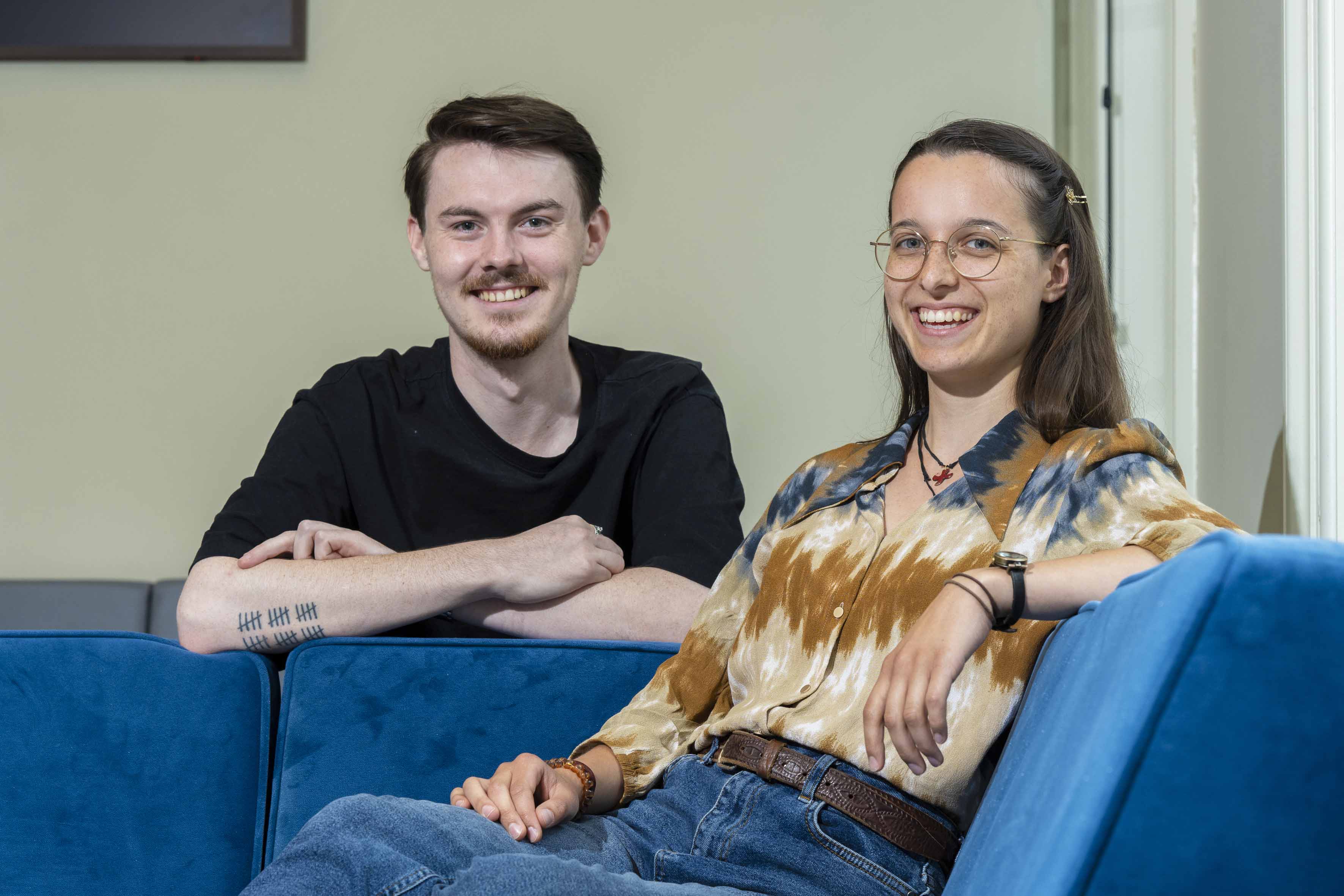
Why do a Master Honours Challenge? ‘Step away from your own square millimetre’
Learning how to work with people from different disciplines, that’s what Master Honours Challenges are all about. In teams, students address a challenge for an organisation or society as a whole. Two participants tell us what made their course stand out. ‘It was at times uncomfortable, but exhilarating.’
Hi Luca and Ariëlle! Could you tell a bit about yourself?
‘I’m Ariëllle, I’m 24 years old and I study linguistics. I like figure skating and doing creative stuff, such as drawing. Coming February, I will start with my PhD on the role of boundary tones in Dutch conversations.’
‘My name is Luca, 24 years old, and I’m from Canada. I like anything visual arts related and hiking. After my bachelor’s in arts and culture in Maastricht I decided to study political philosophy in Leiden. I’m currently writing my thesis on the legitimacy of emergency powers in times of lasting crises, such as climate change.’

How did you end up at a Master Honours Challenge?
Luca: ‘The topic of my thesis matched that of our challenge, Planet in peril. I also had a teacher who recommended the course to me. I actually wasn’t aware of the existence of Master Honours Challenge before he told me.’
Ariëlle: ‘I received an e-mail about the Master Honours Challenges. This one stood out to me since I have an interest in biology and nature, too. I really enjoyed giving those interests some space in this course.’
What did your challenge ‘Planet in peril’ look like?
Luca: ‘Speakers came in from different fields: climate scientists, philosophers, biodiversity experts. They all related to the central topic – human relations with nature and the threat of climate change – but they all had their own angle.’
Ariëlle explains that in the week after the lecture, students presented on related topics in groups of two or three. She and her partner talked about the impact of reforestation on biodiversity, while Luca and his co-presenter discussed the ‘global waste trade’, the illegal transportation of waste worldwide.
Presenting with someone from a different background turned out to be a challenge, says Luca. ‘I worked with a guy from economics. We both wanted to emphasize different aspects, so we had to make compromises. I enjoyed that challenge.’ Ariëlle: ‘I found it refreshing, too. You have to see where your knowledge fills in a gap in their knowledge, and vice versa.’

Speaking of challenges: I heard you also made a documentary.
Luca laughs heartily: ‘We’re amateur film makers, but I’m certainly proud of the final product.’ He and Ariëlle made a documentary with two other students, titled Farming within healthy boundaries. They filmed conversations between a dairy farmer and a biodiversity advisor on how to farm without overexploiting the environment.
Ariëlle: ‘They noted that large-scale projects are not necessarily better for farmers financially, since they involve more risks. It was inspiring to see a lived-in demonstration of these ideas.’
To put the film together, the course offered them a film-making workshop. That was useful and fun, says Ariëlle, but not what she takes away most from film-making. ‘It was really valuable to walk into the scene of a farmer and let him inspire us. That hadn't happened if there had not been a film to make.’
What makes a Master Honours Challenge stand out compared to regular courses?
‘Interdisciplinarity would be number one’, says Luca – but not because it’s all rainbows and unicorns. Rather, it’s a rewarding struggle. ‘It may be scary to walk into conversations you feel not well enough equipped for’, says Luca, who as political philosopher had little experience with the hard science behind climate change.
‘Many times I was lost in data presented’, he admits. ‘At times, we were lost in your comments too’, laughs Ariëlle. ‘Well that’s the thing’, concludes Luca. ‘It’s much more enjoyable because everyone is in the same boat. It is at times uncomfortable, but exhilarating.’ The two also mention the ‘prestigious’ guest lecturers as a plus from the course. ‘It was a huge honour to interact with them and learn from their expertise.’
Do you have some final advice for students?
Luca: ‘It’s an honours course, so be ready for an extra workload. It’s a different mentality, too. You do it not because you have to, but because you enjoy the topic. That’s valuable in and of itself.’
Ariëlle: ‘If you have the time and space for it, I would recommend doing it. You will open up to new perspectives and step away from your own square millimetre niche. That’s valuable for everyone.’

Apply before 13 October 2024
Do you want to look further than your master's?
Apply before 13 October 2024 and shape your future with a Master Honours Challenge (3-10 EC)! You may work on your own business or problem-solve for society as such. View challenges on offer in the prospectus.
Why a Master Honours Challenge?
- You meet and work with students of other disciplines, just like you would in the workplace. This is both fun and insightful.
- You may work with partner organisations and get a taste of what they value in professional life.
- You get to discover whether a work field or area of expertise suits you.
- You look into 'hot topics' and complex (societal) challenges.
- You get to experience experimental education and learn new skills. Some examples of examinations: podcasts, pitches for stakeholders, documentaries, exhibitions.
Are you looking for a 15 EC honours programme to develop your leadership skills? You can still apply for the Leiden Leadership Programme, too! Deadline: 30 September 2024.
Text: Michiel Knoester
Photos: Buro JP
